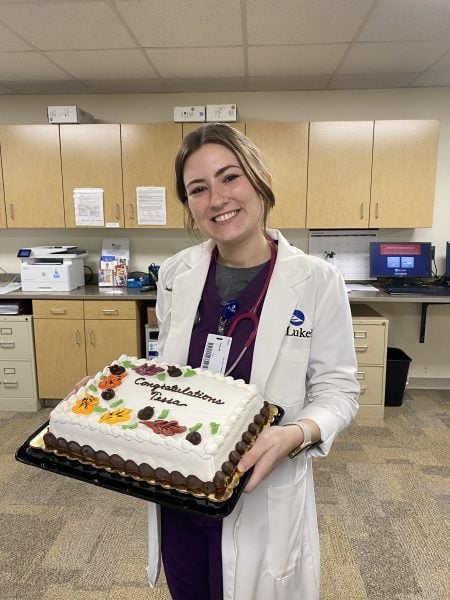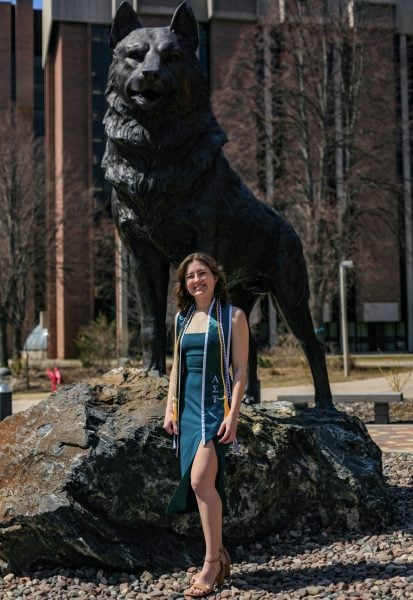
Tessa’s First Application to Medical School
Hello, I am Tessa Mlinar. I graduated from Michigan Tech with a degree in Biological Sciences and a minor in Biochemistry in the spring of 2022. I have always been interested in the medical field. After seeking out various medical experiences, such as shadowing, working in a brain injury facility, and studying to become an EMT, I found that I was most drawn to the work of a doctor. So I did what every undergraduate student does and continued finding meaningful exposure to the field, studying hard to pass all pre-requisite classes and scrolling through way too many pre-med Reddit pages.
After months of preparing my application and not-so-patiently waiting to hear from schools, I faced the hard truth that I was not accepted to any medical schools for the 2022 cycle. So I did once again what any undergraduate student would do: panic. This new realization that I would not be attending medical school after graduating was honestly terrifying. I felt lost, and in this panic, I took the first job I was offered in vaccine development. This job only made me more sure that I would not be happy in any other career than medicine. I was determined to reapply and get into medical school the following cycle, which is easier said than done.
Tessa’s Tips for Reapplying
There are many things that I found helpful in pursuing this goal. I hope other students can find it helpful as well.
1. Utilize Your Resources:
There are many resources available to students to help them prepare for applying to a pre-health program. It is easy to scroll through a multitude of medical school preparation websites, Youtube channels, and discussion boards to find information on a wide variety of topics. Michigan Tech offers many invaluable resources, such as knowledgeable advisors and supportive classmates. I spoke with the Pre-Health Director, Nicole Roeper, about all areas of my application, including reviewing many drafts of my personal statement and completing practice interview questions. In addition, I found much support through the peer-led MCAT study group in knowing that I was not alone in this difficult time. Pre-health is often a competitive environment, and it is easy to think you are the only one struggling. I found it very helpful to have a group of pre-health friends to vent to about the hard steps, and I found many were getting stuck in the same place as I was.
Beyond online, MTU, and personal resources, I highly recommend looking for application advice from pre-health programs you are denied from. Unfortunately, not all programs offer this, but the ones that do can precisely pinpoint where you should improve for future cycles. One school I spoke with was kind enough to walk through each section and give me input on how I could better label each experience I had, what order they review the application in, and even provided tips on when it is best to submit each piece. Getting this feedback directly from the faculty that makes acceptance decisions is incredibly valuable and leads me to my next piece of advice.
2. Understand Where You Are Lacking:
After spending months working on your application and submitting what you believe is the best representation of yourself, it is understandably hard to look at it critically after you hit submit. By speaking with advisors, peers, and the universities that offer application feedback, you may see new areas that you can work to improve on your application. For schools without personal feedback, I found it helpful to look at the mission statements and visions of the schools I was interested in. This gave me a good place to start in seeing what kind of experiences these programs look for and ensuring that I align with their mission. Personally, I found that my GPA and MCAT score was lower than the average applicant’s and that my hands-on patient experience was limited. From here, I set a realistic goal GPA to achieve by graduation, took time off of work to study and retake the MCAT, and added on new patient-facing experiences such as COVID swabbing and volunteer EMT work. You do not have to wait until you are re-applying for this step. I would recommend looking for the areas in which your application is lacking long before you begin applying so that you have time to ensure you are a well-rounded applicant the first time.

3. Remember Your Reason Why:
I cannot emphasize this enough, but remember why you are doing this! Applying to any health program takes time, money, and energy. Remembering why I am doing this has helped me overcome a lot of the struggle that comes with rejection and hardships throughout the process.
Everyone’s journey to the medical field is different, and often only acceptances are spoken about rather than the many rejections that come with it. In addition to sharing my own struggles here, I am happy to share that I have been accepted to medical school and will begin my journey to become a doctor in the fall.
The most important thing I can share from my experience is that failure is not final. When I spoke with the many doctors I work with about getting into school in my second year of applying, many shared their stories of taking two or three, or even more, years to get into schools themselves. Every person has a different path to medicine, so don’t be too hard on yourself if your path ends up differently than you had planned.